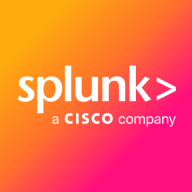

Splunk Enterprise Security and Datadog are both prominent in the security and monitoring solutions category. Datadog has a distinction in cloud-centric environments with its extensive cloud monitoring features, while Splunk Enterprise Security is preferred for its customizable data processing capabilities, making it more adaptable to various organizational needs.
Features: Splunk Enterprise Security provides custom alerts, dashboards, and flexible data input configurations ideal for threat intelligence and custom analytics. It effectively manages large data volumes. Datadog excels with cloud and infrastructure monitoring, offering rich integrations and scalability tailored for dynamic cloud environments.
Room for Improvement: Splunk's deployment complexity could be improved, requiring expertise for effective implementation. Enhancing its cloud-native capabilities might increase its appeal in purely cloud environments. Datadog might benefit from expanding its customization options to match the adaptability offered by Splunk, along with simplifying its integration processes for non-cloud infrastructures.
Ease of Deployment and Customer Service: Splunk's deployment requires specialized knowledge or professional services, leading to more thorough support interactions, whereas Datadog's cloud-based model simplifies deployment. Customer service quality is robust for both platforms.
Pricing and ROI: Splunk often involves higher initial costs due to elaborate setups, impacting ROI favorably over time with successful implementation. Datadog offers more predictable and scalable pricing aligned with usage, potentially providing immediate ROI benefits, especially for organizations valuing quick, out-of-the-box functionality.
Previously we had thirteen contractors doing the monitoring for us, which is now reduced to only five.
Datadog has delivered more than its value through reduced downtime, faster recovery, and infrastructure optimization.
I believe features that would provide a lot of time savings, just enabling you to really narrow down and filter the type of frustration or user interaction that you're looking for.
The documentation for Splunk Enterprise Security is outstanding. It is well-organized and easy to access.
We couldn't calculate what would have been the cost if they had actually gotten compromised; however, they were in the process, so every investment was returned immediately.
On average, my SecOps team takes probably at least a quarter of the time, if not more, to remediate security incidents with Splunk Enterprise Security compared to our previous solution.
When I have additional questions, the ticket is updated with actual recommendations or suggestions pointing me in the correct direction.
Overall, the entire Datadog comprehensive experience of support, onboarding, getting everything in there, and having a good line of feedback has been exceptional.
I've had a couple instances where I reached out to Datadog's support team, and they have been really super helpful and very kind, even reaching back out after resolving my issues to check if everything's going well.
We have paid for Splunk support, and we’re not on the free tier hoping for assistance; we are a significant customer and invest a lot in this service.
I have had nothing but good experiences with Splunk support, receiving timely and helpful replies.
We've had great customer success managers who have helped us navigate scaling from 600 gigs to 30 terabytes.
Datadog's scalability has been great as it has been able to grow with our needs.
We did, as a trial, engage the AWS integration, and immediately it found all of our AWS resources and presented them to us.
Datadog's scalability is strong; we've continued to significantly grow our software, and there are processes in place to ensure that as new servers, realms, and environments are introduced, we're able to include them all in Datadog without noticing any performance issues.
We currently rely on disaster recovery and backup recovery, which takes time to recover, during which you're basically blind, so I'm pushing my leadership team to switch over to a clustering environment for constant availability.
It is one of the things that separates it from other tooling, and if not, it is the most scalable solution out there.
They struggle a bit with pure virtual environments, but in terms of how much they can handle, it is pretty good.
Datadog is very stable, as there hasn't been any downtime or issues since I've been here, and it's always on time.
Datadog seems stable in my experience without any downtime or reliability issues.
Datadog seems to be more stable, and I really want to have a complete demo before making a call to decide on this.
They test it very thoroughly before release, and our customers have Splunk running for months without issues.
Splunk has been very reliable and very consistent.
We need more SMEs, and there is no mechanism to tell us about indexer or search head issues.
It would be great to see stronger AI-driven anomaly detection and predictive analytics to help identify potential issues before they impact performance.
We want to be able to customize the cost part, and we would appreciate more granular access control.
The documentation is adequate, but team members coming into a project could benefit from more guided, interactive tutorials, ideally leveraging real-world data.
Improving the infrastructure behind Splunk Enterprise Security is vital—enhanced cores, CPUs, and memory should be prioritized to support better processing power.
Splunk Enterprise Security is not something that automatically picks things; you have to set up use cases, update data models, and link the right use cases to the right data models for those detections to happen.
For any future enhancements or features, such as MLTK and SOAR platform integration, we need more visibility, training, and certification for the skilled professionals who are working.
The setup cost for Datadog is more than $100.
Everybody wants the agent installed, but we only have so many dollars to spread across, so it's been difficult for me to prioritize who will benefit from Datadog at this time.
My experience with pricing, setup cost, and licensing is that it is really expensive.
I saw clients spend two million dollars a year just feeding data into the Splunk solution.
The platform requires significant financial investment and resources, making it expensive despite its comprehensive features.
I find it to be affordable, which is why every industry uses it.
Our architecture is written in several languages, and one area where Datadog particularly shines is in providing first-class support for a multitude of programming languages.
Having all that associated analytics helps me in troubleshooting by not having to bounce around to other tools, which saves me a lot of time.
Datadog was able to find the alerts and trigger to notify our team in a very prompt manner before it got worse, allowing us to promptly adjust and remediate the situation in time.
This capability is useful for performance monitoring and issue identification.
I assess Splunk Enterprise Security's insider threat detection capabilities for helping to find unknown threats and anomalous user behavior as great.
Splunk Enterprise Security provides the foundation for unified threat detection, investigation, and response, enabling fast identification of critical issues.
| Product | Market Share (%) |
|---|---|
| Splunk Enterprise Security | 6.9% |
| Datadog | 4.5% |
| Other | 88.6% |

| Company Size | Count |
|---|---|
| Small Business | 80 |
| Midsize Enterprise | 46 |
| Large Enterprise | 99 |
| Company Size | Count |
|---|---|
| Small Business | 109 |
| Midsize Enterprise | 50 |
| Large Enterprise | 264 |
Datadog integrates extensive monitoring solutions with features like customizable dashboards and real-time alerting, supporting efficient system management. Its seamless integration capabilities with tools like AWS and Slack make it a critical part of cloud infrastructure monitoring.
Datadog offers centralized logging and monitoring, making troubleshooting fast and efficient. It facilitates performance tracking in cloud environments such as AWS and Azure, utilizing tools like EC2 and APM for service management. Custom metrics and alerts improve the ability to respond to issues swiftly, while real-time tools enhance system responsiveness. However, users express the need for improved query performance, a more intuitive UI, and increased integration capabilities. Concerns about the pricing model's complexity have led to calls for greater transparency and control, and additional advanced customization options are sought. Datadog's implementation requires attention to these aspects, with enhanced documentation and onboarding recommended to reduce the learning curve.
What are Datadog's Key Features?In industries like finance and technology, Datadog is implemented for its monitoring capabilities across cloud architectures. Its ability to aggregate logs and provide a unified view enhances reliability in environments demanding high performance. By leveraging real-time insights and integration with platforms like AWS and Azure, organizations in these sectors efficiently manage their cloud infrastructures, ensuring optimal performance and proactive issue resolution.
Splunk Enterprise Security delivers powerful log management, rapid searches, and intuitive dashboards, enhancing real-time analytics and security measures. Its advanced machine learning and wide system compatibility streamline threat detection and incident response across diverse IT environments.
Splunk Enterprise Security stands out in security operations with robust features like comprehensive threat intelligence and seamless data integration. Its real-time analytics and customizable queries enable proactive threat analysis and efficient incident response. Integration with multiple third-party feeds allows detailed threat correlation and streamlined data visualization. Users find the intuitive UI and broad compatibility support efficient threat detection while reducing false positives. Despite its strengths, areas such as visualization capabilities and integration processes with cloud environments need enhancement. Users face a high learning curve, and improvements in automation, AI, documentation, and training are desired to maximize its potential.
What Are the Key Features of Splunk Enterprise Security?In specific industries like finance and healthcare, Splunk Enterprise Security is instrumental for log aggregation, SIEM functionalities, and compliance monitoring. Companies leverage its capabilities for proactive threat analysis and response, ensuring comprehensive security monitoring and integration with various tools for heightened operational intelligence.
We monitor all Log Management reviews to prevent fraudulent reviews and keep review quality high. We do not post reviews by company employees or direct competitors. We validate each review for authenticity via cross-reference with LinkedIn, and personal follow-up with the reviewer when necessary.